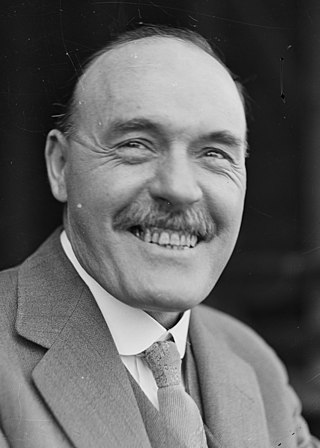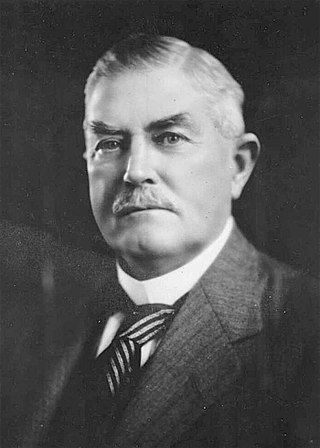Related Research Articles
Wammerawa was an electoral district for the Legislative Assembly in the Australian State of New South Wales, created in 1920, with the introduction of proportional representation and named after an alternative name for the Macquarie River. It mainly replaced Mudgee, Castlereagh and Liverpool Plains and elected three members simultaneously. In 1927, it was split into Mudgee, Castlereagh and Liverpool Plains.
Members of the New South Wales Legislative Assembly who served in the 26th parliament of New South Wales held heir seats from 1922 to 1925. They were elected at the 1922 state election on 25 March 1922. The Speaker was Daniel Levy.
Members of the New South Wales Legislative Assembly who served in the 25th parliament of New South Wales held their seats from 1920 to 1922. They were elected at the 1920 state election on 20 March 1920. The Speaker was Daniel Levy with the exception of 13–20 December 1921 when he was replaced by Simon Hickey.

The 1925 New South Wales state election was held on 30 May 1925. This election was for all of the 90 seats in the 27th New South Wales Legislative Assembly and was conducted in multiple-member constituencies using the Hare Clark single transferable vote. The 26th parliament of New South Wales was dissolved on 18 April 1925 by the Governor, Sir Dudley de Chair, on the advice of the Premier Sir George Fuller.
Ryde, an electoral district of the Legislative Assembly in the Australian state of New South Wales, has had four incarnations since it was first established in 1894. It has returned one member for most of its existence, except for the period 1920 to 1927 when it returned five members.
Sydney, an electoral district of the Legislative Assembly in the Australian state of New South Wales, has had two incarnations, the first from 1920 to 1927 as a five-member electorate, the second from 2007 to the present as a single-member electorate.
Balmain, an electoral district of the Legislative Assembly in the Australian state of New South Wales, has had three incarnations since it was established in 1880. It expanded from 1 to 2 to 3 to 4 members before being abolished in 1894. It was re-established in 1904 returning 1 member until 1920. When multiple member constituencies were established using the Hare-Clark single transferable vote in 1920, Balmain returned 5 members. It had a single member from 1927 when the state returned to single member electorates. It was abolished in 1991 and largely replaced by Port Jackson which included the Sydney CBD. It was re-established in 2007 when Port Jackson was abolished.

William George Ashford was an Australian politician.

The 1922 New South Wales state election was held on 25 March 1922. This election was for all of the 90 seats in the 26th New South Wales Legislative Assembly and it was conducted in multiple member constituencies using the Hare Clark single transferable vote. The 25th parliament of New South Wales was dissolved on 17 February 1922 by the Governor, Sir Walter Edward Davidson, on the advice of the Premier James Dooley.

Frank Farnell was a member of the New South Wales Legislative Assembly representing Central Cumberland and Ryde for the Free Trade Party.
This is a list of electoral district results for the 1950 New South Wales state election.
The 1930 New South Wales state election was for 90 electoral districts each returning a single member with compulsory preferential voting. The principal change from the 1927 election was the division of the state into 3 zones, Sydney with forty-three districts, Newcastle with five, and the country with forty-two. While the average number of enrolled voters per electorate was 16,009, in the country zone the average was 13,028,, in Newcastle 18,933, and Sydney 18,580.
The 1927 New South Wales state election was for 90 electoral districts returning 90 members and all elections were held on 8 October 1927.
The 1925 New South Wales state election was for 90 seats representing 24 electoral districts, with each district returning between 3 and 5 members. This was the third and final election in New South Wales that took place under a modified Hare-Clark voting system. The average number of enrolled voters per member was 14,690, ranging from Sturt (10,297) to Ryde (19,119).
The 1920 New South Wales state election was for 90 seats representing 24 electoral districts, with each district returning between 3 and 5 members. This was the first election in New South Wales that took place under a modified Hare-Clark voting system. The average number of enrolled voters per member was 12,805, ranging from Sturt (11,539) to Sydney (13,478).
The 1858 New South Wales colonial election was to return 54 members of Legislative Assembly composed of 34 electoral districts with 18 returning 1 member, 13 returning 2 members, two returning 3 members and one returning 4 members, all with a first past the post system. In multi-member districts, because each voter could cast more than one vote, it is not possible to total the votes to show the number of voters and voter turnout in these districts is estimated. 17 members from 14 districts were returned unopposed. The electoral districts and boundaries were established under the Electoral Act 1851 (NSW) for the former Legislative Council.
Eastern Suburbs, an electoral district of the Legislative Assembly in the Australian state of New South Wales was created in 1920 and abolished in 1927.
Wammerawa, an electoral district of the Legislative Assembly in the Australian state of New South Wales, was created in 1920 and abolished in 1927.
The 1904 New South Wales state election involved 90 electoral districts returning one member each. The election was conducted on the basis of a simple majority or first-past-the-post voting system. There were two significant changes from the 1901 election, the first was that women were given the right to vote, which saw an increase in the number of enrolled voters from 345,500 in 1901, to 689,490 in 1904. The second was that as a result of the 1903 New South Wales referendum, the number of members of the Legislative Assembly was reduced from 125 to 90. The combined effect of the changes meant that the average number of enrolled voters per electorate went from 2,764, to 7,661, an increase of 277%. Leichhardt was the only district that was not substantially changed, while The Macquarie and The Murray districts retained nothing but the name.
Sturt, an electoral district of the Legislative Assembly in the Australian state of New South Wales, had two incarnations, from 1889 until 1968 and from 1971 until 1981.
References
- 1 2 Green, Antony. "1922 election totals". New South Wales Election Results 1856-2007. Parliament of New South Wales . Retrieved 2 October 2019.
- ↑ Green, Antony. "1922 Turnout". New South Wales Election Results 1856-2007. Parliament of New South Wales . Retrieved 16 November 2021.
- ↑ Green, Antony. "1922 Balmain". New South Wales Election Results 1856-2007. Parliament of New South Wales . Retrieved 3 May 2020.
- ↑ Green, Antony. "1922 Bathurst". New South Wales Election Results 1856-2007. Parliament of New South Wales . Retrieved 3 May 2020.
- ↑ Green, Antony. "1922 Botany". New South Wales Election Results 1856-2007. Parliament of New South Wales . Retrieved 3 May 2020.
- ↑ Green, Antony. "1922 Byron". New South Wales Election Results 1856-2007. Parliament of New South Wales . Retrieved 3 May 2020.
- ↑ Green, Antony. "1922 Cootamundra". New South Wales Election Results 1856-2007. Parliament of New South Wales . Retrieved 3 May 2020.
- ↑ Green, Antony. "1922 Cumberland". New South Wales Election Results 1856-2007. Parliament of New South Wales . Retrieved 3 May 2020.
- ↑ Green, Antony. "1922 Eastern Suburbs". New South Wales Election Results 1856-2007. Parliament of New South Wales . Retrieved 3 May 2020.
- ↑ "The ALP: definite action taken against candidates who sign pledges". The Sydney Morning Herald . 10 March 1920. p. 11. Retrieved 2 November 2019– via National Library of Australia.
- ↑ Green, Antony. "1922 Goulburn". New South Wales Election Results 1856-2007. Parliament of New South Wales . Retrieved 3 May 2020.
- ↑ Green, Antony. "1922 Maitland". New South Wales Election Results 1856-2007. Parliament of New South Wales . Retrieved 3 May 2020.
- ↑ Green, Antony. "1922 Murray". New South Wales Election Results 1856-2007. Parliament of New South Wales . Retrieved 3 May 2020.
- ↑ Green, Antony. "1922 Murrumbidgee". New South Wales Election Results 1856-2007. Parliament of New South Wales . Retrieved 3 May 2020.
- ↑ Green, Antony. "1922 Namoi". New South Wales Election Results 1856-2007. Parliament of New South Wales . Retrieved 3 May 2020.
- ↑ Green, Antony. "1922 Newcastle". New South Wales Election Results 1856-2007. Parliament of New South Wales . Retrieved 3 May 2020.
- ↑ Green, Antony. "1922 North Shore". New South Wales Election Results 1856-2007. Parliament of New South Wales . Retrieved 3 May 2020.
- ↑ Green, Antony. "1922 Oxley". New South Wales Election Results 1856-2007. Parliament of New South Wales . Retrieved 3 May 2020.
- ↑ Green, Antony. "1922 Parramatta". New South Wales Election Results 1856-2007. Parliament of New South Wales . Retrieved 3 May 2020.
- ↑ Green, Antony. "1922 Ryde". New South Wales Election Results 1856-2007. Parliament of New South Wales . Retrieved 3 May 2020.
- ↑ Green, Antony. "1922 St George". New South Wales Election Results 1856-2007. Parliament of New South Wales . Retrieved 3 May 2020.
- ↑ Green, Antony. "1922 Sturt". New South Wales Election Results 1856-2007. Parliament of New South Wales . Retrieved 3 May 2020.
- ↑ Green, Antony. "1922 Sydney". New South Wales Election Results 1856-2007. Parliament of New South Wales . Retrieved 3 May 2020.
- ↑ Green, Antony. "1922 Wammerawa". New South Wales Election Results 1856-2007. Parliament of New South Wales . Retrieved 3 May 2020.
- ↑ "Petition: electoral district of Wammerawa". Government Gazette of the State of New South Wales . No. 97. 22 June 1922. p. 3410. Retrieved 4 November 2019– via National Library of Australia.
- ↑ "Wammerawa: Mr Ashford ousted, Mr Clark elected, committee's decision". The Sydney Morning Herald . 27 July 1922. p. 6. Retrieved 4 November 2019– via National Library of Australia.
- ↑ Green, Antony. "1922 Wammerawa recount". New South Wales Election Results 1856-2007. Parliament of New South Wales . Retrieved 4 November 2019.
- ↑ Green, Antony. "1922 Western Suburbs". New South Wales Election Results 1856-2007. Parliament of New South Wales . Retrieved 3 May 2020.
- ↑ Green, Antony. "1922 Wollondilly". New South Wales Election Results 1856-2007. Parliament of New South Wales . Retrieved 3 May 2020.